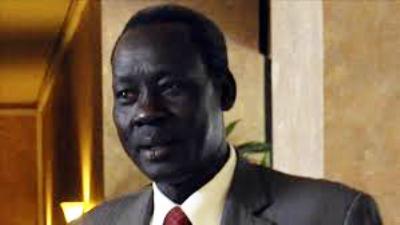Deng Alor in South Sudanese capital for talks on peace implementation
October 10, 2018 (JUBA) – Deng Alor, a leading member of the SPLM-Former Detainees (FDs) arrived in Juba on Wednesday to be the first opposition leader to return to the south Sudanese after the signing of the revitalized peace agreement last September.

“I came to attend the first meeting of the pre-transitional committee,” he said. Also, Dhieu Mathok Minister of Dam and Electricity who received Deng on at the airport said Alor is in Juba on an invitation by committee chairperson and presidential adviser Tut Kew Gatluak.
However, it is believed that his visit to Juba was courtesy visit aiming to build confidence with the government it was agreed that the meeting would take place in Khartoum as the SPLM-IO representative and the committee’s deputy chair Oyet Nathaniel Pierino and SSOA chairperson and deputy chair declined to attend the meeting.
In accordance with the revitalized peace agreement, the opposition leaders would return to the country at the end of the pre-transitional period.
Alor arrived in Juba from Nairobi where he participated in a meeting of FDs leaders to ratify the peace pact together with the other leaders of the opposition group.
The group said they endorsed the revitalized peace agreement stressing that they believe more efforts are needed to ensure the implementation of this imperfect deal and to build on it for a better future for the country.
The group leader and former SPLM secretary general Pagan Amum had voiced his rejection of the deal together with some opposition groups of the South Sudan Opposition Alliance.
However, Alor told reporters in Juba that Amum has changed his mind and now he is backing the revitalized peace agreement.
During his stay in Juba, the former foreign minister is expected to meet President Salva Kiir.
The International community and the Troika countries, in particular, say they need to be convinced about the parties’ commitment to the peace deal before to support and provide the needed funds for its implementation.
(ST)
